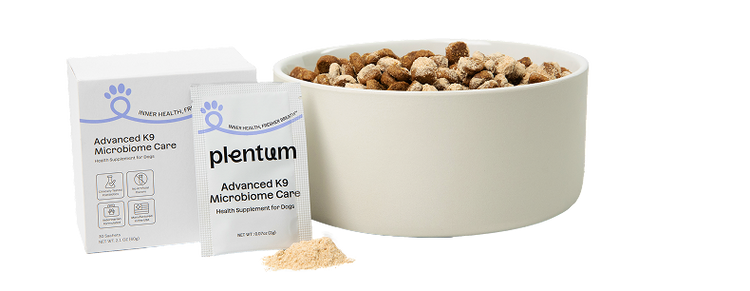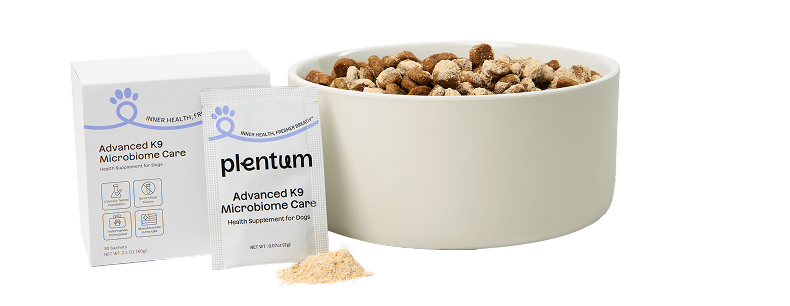
What is the Canine Gut Microbiome? The Hidden World Inside
Beneath the surface of barks and tail wags lies the canine gut microbiome. This complex community of trillions of microbes including bacteria, fungi, and viruses acts like a vital organ, working to keep your dog in balance. The microscopic ecosystem is primarily composed of two bacterial groups, known as Firmicutes and Bacteroidetes, which specialize in the fermentation of fiber and the breakdown of protein.1
Interestingly, a dog's microbiome is unique. For example, the bacteria Fusobacterium is a marker of good health in dogs, but it's linked to disease in humans.1 This highlights why human supplements are not suitable for our canine friends and why a species-specific approach to dog gut health is essential.
When Good Guts Go Bad: Recognizing Dysbiosis

The disruption of the gut's delicate equilibrium, known as dysbiosis, triggers a sequence of health problems. The gut microbiome becomes less diverse, while harmful microbes multiply and beneficial ones decrease in number.
Common Symptoms of Poor Dog Gut Health
The most obvious signs of an imbalanced gut are digestive. Be vigilant for these symptoms:
- Diarrhea: Dog Diarrhea has loose, watery, or frequent stools.
- Vomiting: Forceful expulsion of stomach contents.
- Constipation: Straining to pass feces.
- Gas or Flatulence: A sign of poor digestion.
- Changes in Appetite: Sudden loss of interest in food.
- Abdominal Pain: A hunched posture, whining, or sensitivity to touch.
However, the consequences of poor dog gut health extend beyond the tummy. The large majority of a dog’s immune system resides in the gut, and any imbalance can result in systemic inflammation, which presents as:
- Skin and Coat Issues: Chronic itching, hot spots, and a dull coat.
- Allergies: Excessive reactions to food or environmental substances.
- Joint Discomfort: Systemic inflammation can contribute to stiffness.
Did You Know? The gut and brain are in constant communication through the Gut-Brain Axis. When the gut remains inflamed for an extended period, it sends distress signals to the brain, which may lead dogs to develop anxiety and fear-based behaviors.1
A Proactive Approach: The Power of 'Ome-biotics'
To improve your dog's gut health naturally, a proactive strategy is best. The approach focuses on sustaining beneficial microbes and supporting the gut barrier. Pet owners must understand the roles of prebiotics, probiotics, and postbiotics.2
Prebiotics: Fertilizer for the Good Guys
Prebiotics are specialized fibers that act as food for the beneficial microbes in your dog’s gut. The beneficial bacteria ferment prebiotics to generate Short-Chain Fatty Acids (SCFAs), which power colon cells while strengthening gut walls and inhibiting the growth of pathogens.2
- Examples: Fructooligosaccharides (FOS) and Inulin.
Probiotics: Sending in Reinforcements
Probiotics represent beneficial live microorganisms that help restore equilibrium when dysbiosis occurs. You need to select a product that contains scientifically proven, canine-specific strains because the effects of probiotics depend on the specific strain.2
- Examples: Bifidobacterium animalis, Lactobacillus acidophilus.
Postbiotics: The Future of Gut Health Management
Postbiotics represent inactive microbial elements and their beneficial byproducts. These products demonstrate superior stability because their composition remains unchanged under varying temperature conditions and exposure to air or stomach acid. This method ensures a consistent delivery of beneficial compounds, which both enhance gut barrier integrity and generate anti-inflammatory effects. A research study demonstrated that combining prebiotics with postbiotics produced a significant increase of beneficial Short-Chain Fatty Acid (SCFA) production in dogs.3
Comparison: Prebiotics vs. Probiotics vs. Postbiotics
|
Feature |
Prebiotics |
Probiotics |
Postbiotics |
|
What is it? |
Live beneficial bacteria and yeasts |
Inanimate (heat-killed) bacteria and their beneficial compounds |
|
|
Analogy |
Fertilizer for the gut's garden |
Reinforcement troops for the gut's army |
The tools and signals left behind by the troops |
|
Mechanism |
Temporarily colonize the gut, compete with pathogens |
Directly interact with host cells to provide benefits |
|
|
Key Benefit |
Nourishes existing beneficial bacteria |
Helps restore balance during dysbiosis |
Highly stable; provides reliable immune support |
|
Examples |
Inulin, FOS, Acacia Gum |
Bifidobacterium animalis |
Heat-killed Lactobacillus, Yeast Fractions |
Essential Nutrients for a Resilient Gut Lining

The gut requires the same level of physical maintenance as microbial management.
L-Glutamine functions as a vital amino acid that provides energy to cells that line the intestines. Its mechanism helps maintain the "tight junctions" between intestinal cells, which blocks "Leaky Gut Syndrome" and prevents toxins and pathogens from escaping into the bloodstream. The addition of L-glutamine supplements creates a stronger intestinal barrier while simultaneously decreasing inflammation levels.
Your Action Plan for Optimal Dog Gut Health

A high-quality diet and a stress-free environment provide a foundation, yet specific supplements deliver additional strength. The most successful method involves a harmonious blend of:
- Prebiotics nourish resident beneficial bacteria.
- Probiotics to send in reinforcements.
- Postbiotics to provide stable and direct benefits.
- Key nutrients, such as L-glutamine, help repair the gut lining.
The entire dog gut ecosystem benefits from this multi-faceted approach to achieve sustained, long-term health.
Partner with Your Veterinarian
Seek advice from your veterinarian before initiating any new supplement. The veterinarian will verify which supplements best match your dog's needs and identify any hidden health problems. The American Veterinary Medical Association (AVMA) website contains information about veterinary medical best practices.
Conclusion: A Healthier Gut for a Happier Dog
Your dog's gut contains a vital command center that controls their total body health. Your knowledge of prebiotics, probiotics, and postbiotics will enable you to transcend symptom management and actively support your dog's microbiome. A comprehensive dog gut health approach represents a significant investment in your pet, laying the foundation for a joyful and vibrant life.
Do you want to support your dog's inner health? Explore Plentum's science-backed digestive health formula today.





